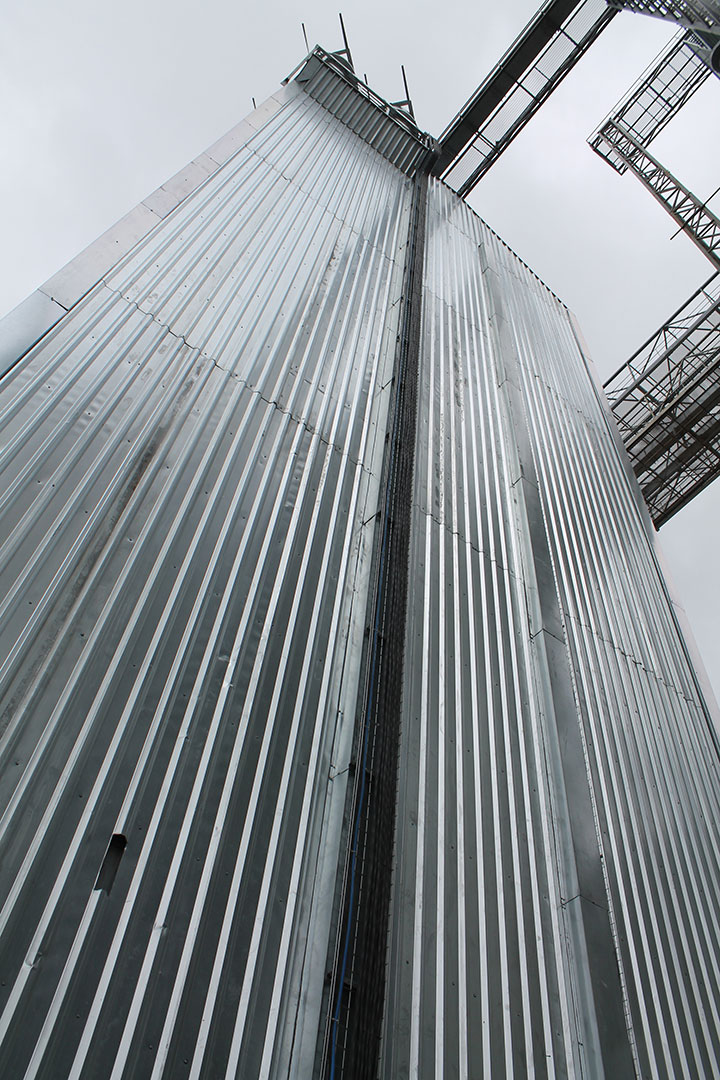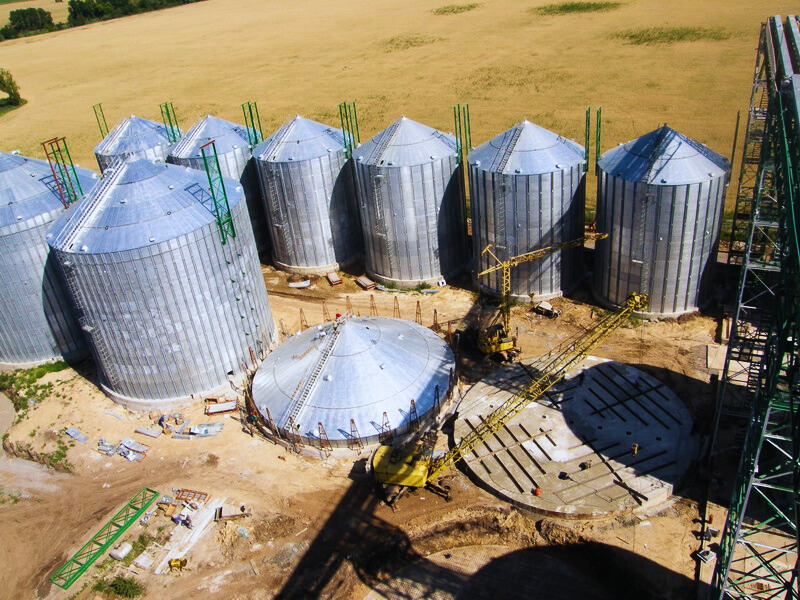
Articles and reviews

Borys Rybachuk: Despite the war, farmers continue to build
28.10.2022
Deputy CEO for development of KMZ Industries about how the company was able to retain 70% of pre-war customers during the war
After the start of the war, many steel processing companies of Ukraine faced a wave of problems: disruption of supply chains, rising prices of raw materials and logistics, etc. The search for new sources of supply and reorganization of logistics, system communication with customers, and the availability of warehouse stocks of materials helped to quickly resume work. Borys Rybachuk, deputy CEO for development of KMZ Industries, a leader in the production of elevator equipment in Ukraine, told about it in an interview for GMK Center.
Tell us about the company’s work during the war.
– It is clear that there was a shock on February 24. However, the company did not stop working. Production was put on hold for literally two weeks, during which we were engaged in maintenance of the equipment. We did not relocate our industrial facilities: it remained where it was.
We immediately began to communicate with customers regarding the relevance of orders already available at the beginning of a full-scale war. Because of the war, we had a number of problems, primarily with logistics. It increased in price very significantly, which affected the cost of production. In addition, since the production of our products requires a very large list of various materials and components, many difficulties have arisen.
Ukrainian producers of ferrous metal stopped working or were simply unavailable. We tried to buy steel products as much as possible from the warehouse stocks of domestic producers, but due to the stoppage of their production, we had to buy a lot of foreign steel at much higher prices.
The drivers of the enterprise took orders from warehouses in Druzhkivka almost under fire: we used their bolts and hardware in the production of silos. Therefore, we also had to buy a large number of foreign-made hardware.
By the way, work in all areas of the plant in such conditions once again proved how brave our people are. Everyone has their own front, and everyone is doing everything possible and impossible for the victory of Ukraine.
What anti-crisis measures did the company implement in connection with the war?
– Part of our Kyiv sales team went to the western regions, some went abroad. We also helped the employees of the Kharkiv office to leave: this office has not yet resumed work, but all its employees are currently working in Karlivka and its region, some of them are working remotely from Poland. Our first priority was to quickly establish internal communications, and our main task was to make sure that employees were safe and that they could resume work. We managed to deal with this quickly, because in the COVID-19 period we already had the experience of remote office work.
As for cost reduction, as it usually happens in any crisis situation, we partially froze the modernization of production, although before the war we actively moved in this direction. After the merger of KMZ Industries with Variant Agro Build in April 2021, we transported equipment to our facilities, purchased new machines, and repaired workshops. With the beginning of the war, we temporarily stopped all activities in this direction. But now we are gradually returning to work on some investment projects. We also did a lot of work on reducing expenses and restructuring debts (for example, we agreed to pay only 15% of the Kyiv office’s rent – the landlords came to meet us), we went into economy mode in all directions to maximize the efficiency of the enterprise. However, we can say that now we are already working almost in a pre-war mode.
KMZ Industries imports galvanized steel for production needs. How has the logistics of these supplies changed and become more expensive?
– At the beginning of the year, prices increased, as the euro exchange rate also did. But most importantly, since we need galvanization in a very large volume, we lost the most on delivery: its cost has increased by 1.5-2 times since the beginning of the year. Of course, this hurt the company and reflected in the total price of our products. In certain periods, delivery from several directions was 3 times more expensive than before the war.
The unavailability of sea delivery also became a big problem. Galvanizing, which had already been sent by sea to us in February, was returned to the producers: it was necessary to change the receiving port and then bring it from Europe by truck, for which the demand has increased significantly. Due to this, the delivery turned out to be many times more expensive and longer than planned (some orders reached us 4-5 months later).
What Ukrainian steel products is the company lacking now? Is it possible to completely cover existing needs with imports?
– In principle, it is enough, especially taking into account the fact that production has resumed in Zaporizhzhia. Despite the rise in prices, it is more profitable to buy domestic steel products than European ones.
How have prices for steel used in production changed? How did it affect the cost of final products and services?
– During 2021, prices rose with periodic fluctuations. At the beginning of 2022, European galvanizing prices increased slightly compared to the end of the last year (by 5-10%). At the end of the summer, prices decreased slightly, but now they have started to rise again – because the cost of energy resources is increasing and at the same time the supply is decreasing.
In general, the growth of prices for ferrous metal and components was larger than for galvanizing, the prices of which were significantly affected only by the exchange rate. Customers who paid for contracts before the start of the war benefited significantly. Because for them all the price increases were not as noticeable (depending on the terms, value of the contracts and the products themselves) as for customers under completely new contracts.
How did customers react to the possible increase in the cost of final products and services?
– We contacted each client and explained the situation. First, we were as open as possible, explaining in detail why the cost of the order changed. If the clients agreed to continue cooperation under the new conditions, we, for our part, were ready to produce and supply the equipment, not to stop the contracts. And customers who could not continue cooperation on such terms had the opportunity to put the agreement on hold and return to it later. It helped us a lot that we started doing it almost immediately after the start of the war – already in the middle of March. I know that at other producers, where negotiations started later, customers, realizing that they would not have time to build before the season, broke contracts or simply stopped payments. And we made it on time.
Secondly, the fact that we still did not put the client in front of the fact, but gave him a choice, played a role: we make it more expensive for objective reasons but now, or we return to this issue later.
And thirdly, clients are also in the same country, they understand that the situation is very difficult. For our part, we were completely transparent: we openly showed calculations regarding the cost of our products, how the prices of materials increased, and they could check this all – both with regard to ferrous metal, to steelwork or to galvanizing. That is, we tried to create such conditions where everything is as transparent as possible and clients understand that we remain their partners in this situation and try to find a joint solution.
What are the results of the company’s recovery?
– We managed to restore about a third of the orders at first. And as of today, more than 70% of clients who concluded agreements last fall and winter, even before the war, have renewed their contracts with us. Contracts currently on hold are mainly contracts from the most affected regions, where construction is currently impossible, or from de-occupied regions, where construction is difficult: there are still mined areas, destroyed bridges, and other difficulties and risks.
The other day we made a calculation: now almost 40% of our order portfolio are new customers, those who came after February 24. This shows that despite the war, agrarians continue to build.
In addition to the general shortage of grain storage capacity, which existed even before the war, the main problems now became logistics. The ports were down for quite some time, and customers were forced to increase their own storage capacity. At the same time, everyone realized how dependent we are on sea ports, so for the sake of diversification, we began to build our own so-called dry ports on the border with Moldova, Romania, and Poland (for the accumulation of large batches of grain and transshipment from rail and road transport to the narrow European track). And KMZ Industries also participates in such projects.
The interview is published in GMK Center.
POPULAR
ПОНАД 5000 ПРОЄКТІВ
ВТІЛЕНО В СВІТІ
CONTACTS
HEAD OFFICE
+38 (05346) 221 38
2 Sergii Nihoian St., Karlivka, Poltava region, 39500, Ukraine
SALES OFFICE
+38 (050) 435 76 97
sales@kmzindustries.ua ,
2V Mykilsko-Slobidska St., office 157, Kyiv, 02002, Ukraine







